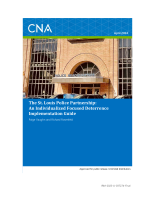Parole officers
Process Evaluation of the Virginia Department of Juvenile Justice’s Regional Service Coordination Model: NIJ Final Report
How Are Adult Felony Sex Offenders Managed on Probation and Parole? A National Survey, Final Report
Planning and Administration - Minnesota Community Corrections Act Evaluation
"I Feel Like I'm Always on Edge": Perceptions of Parole Supervision by Parolees with Substance Use Disorders
The St. Louis Police Partnership: An Individualized Focused Deterrence Implementation Guide
Just Science Podcast: Just Navigating Reentry Using Peer Support
Applying a Developmental Evaluation Approach to Address Community Safety and Health Challenges of Reintegration Programs in the USA
Research and Practitioner Perspectives on the Rehabilitation and Reintegration of Violent Extremists
Conceptualizing the Personal Touch Experiential Knowledge and Gendered Strategies in Community Supervision Work
Can Social Support Overcome the Individual and Structural Challenges of Being a Sex Offender? Assessing the Social Support-Recidivism Link
A Leg Up: NIJ's Graduate Research Fellowship Program
NIJ Director Dr. Nancy La Vigne joins the show to interview Dr. Marie Garcia, Director of NIJ’s Criminal Justice Systems Division and a former NIJ graduate research fellow. They discuss the application process, Marie’s experience as a fellow while at Temple University, and advice for future applicants.
Reading and Resources from NIJ:
NIJ Recidivism Challenge Report: Team Smith
Taking Stock: An Overview of NIJ's Reentry Research Portfolio and Assessing the Impact of the Pandemic on Reentry Research
Over several decades, the National Institute of Justice (NIJ) has made significant contributions to the field of reentry, specifically what works for whom and when. In recent years, however, the global pandemic has made it increasingly difficult to conduct research on and with populations involved with the justice system. During this time, many researchers assessing various justice-related outcomes were unable to continue their inquiries as planned due to a lack of access to their populations of interest, forcing many to pivot and rethink their research designs.
See the YouTube Terms of Service and Google Privacy Policy
From Successful Reentry to Stronger Communities
Implementing the Next Generation of Parole Supervision: Findings from the Changing Attitudes and Motivation in Parolees Pilot Study
Desistance From Crime: Implications for Research, Policy, and Practice
Most scholars would agree that desistance from crime – the process of ceasing engagement in criminal activities – is normative. However, there is variability in the literature regarding the definition and measurement of desistance, the signals of desistance, the age at which desistance begins, and the underlying mechanisms that lead to desistance. Even with considerable advances in the theoretical understanding of desistance from crime, there remain critical gaps between research and the application of that research to practice.
See the YouTube Terms of Service and Google Privacy Policy









